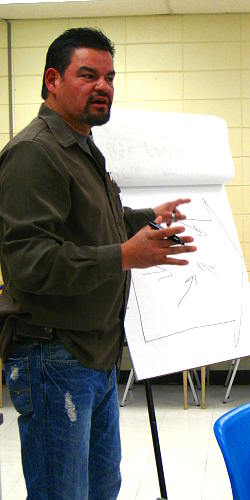 NEWS RELEASE
NEWS RELEASE
SERPENT RIVER FIRST NATION
*************************
First Nation duty to consult before the courts
SERPENT RIVER FIRST NATION ( June 11, 2013) - Serpent River First Nation have pressed talks with the City of Elliot Lake and the province of Ontario, after initiating a judicial review court action in May 2012.
The First Nation is seeking to overturn a decision by the City, which took unilateral action on a site of cultural significance located on Spine Road in Elliot Lake.
The First Nation has asserted that these actions were taken without properly ensuring archaeological fieldwork was formally completed.
The central legal issue facing the parties is whether the City of Elliot Lake or the province had a duty to consult Serpent River First Nation over a proposed subdivision development near the city’s hospital.
The City approved this development in December 13, 2010 but failed to consult this First Nation on issues that directly impact them.
Serpent River First Nation has always maintained that the area in question contains a high degree of cultural value to the First Nation, as it is a location historically inhabited by their people; both pre and post contact.
Initially, the First Nation was not overly concerned with the proposed development.
The community relied on the application of the rule-of-law which governs the ‘duty to consult and accommodate’.
This did not happen.
An archeologist hired by the developer determined features on the land were characteristic of mounds, with potential archeological values.
The developer notified the First Nation of this finding.
The problem was, the archeological report’s findings were highly questionable and the process was conducted in a hasty fashion without a clear objective.
This same report’s findings remain at issue for the province as they have sought additional information from the archaeologist.
After learning of these mounds from the same archaeologist, the City declared that the mounds had a ‘potential’ of containing a burial site and confined their findings to a single lot, stating that there were no other potential values on any other part of the proposed development.
After this conclusion, the City approved the draft plan subdivision. In an unusual move, the City reached this decision behind closed doors and without input from the First Nation.
Later, the City failed to notify the First Nation of their decision.
The City is the current owner of the segregated lot, however the First Nation maintains that this does not resolve a long list of concerns that they expect to assert in a fair and transparent judicial process.
During the months that culminated within this dispute, the City never approached the First Nation.
Despite First Nation attempts to discuss the matter, declaring that they wished to resolve outstanding questions about the process, it remains undisputed that they were not consulted as required by Canada’s Constitution.
Two and a half years after this ill-fated development was approved by the City, it remains subject to two court challenges by the First Nation.
It was recently revealed to the City and the First Nation that the archaeologist’s work was never completed and was not in compliance with Ontario’s standards that govern the work of archeologists.
The First Nation maintains that as the party that approved of the project, the City has the responsibility to exercise all aspects of due diligence within law and the regulations that guide the full and fair application of the duty to consult and accommodate First Nation interests.
This did not occur.
It is also now revealed the City did not ensure it had a complete archaeological report in hand when making its decision that there was potential archeological values located of that site.
In fact, the archaeological fieldwork remains incomplete, with the province seeking additional information from the archaeologist.
The First Nation insists it is the duty of the City, as the approver, to ensure that their decisions are based on accurate and sound information.
The First Nation is dismayed about the time, money and impact on community relations that have been disregarded as a result of a legal duty being side-stepped, first within the City’s decision-making process and now by refusing to acknowledge their legal errors.
“Serpent River First Nation only expects to be granted what is due – a fair approach to consultation. The lack of accommodating our interests in this process has proven to be an unnecessary infringement against our community. What strikes deeply here for us is the lack of respect and understanding for our customs and history, as well as a disregard for constitutionally protected Aboriginal and treaty rights. Perhaps its time to apply the full extent of the law – our requests have certainly not been heard,” says Chief Isadore Day [shown in file photo] of Serpent River First Nation.
Talks between the province, the City, the First Nation are expected to resume in the near future.
If the matter cannot be settled, the First Nation’s application to overturn the City’s decision will be heard in the fall of 2013.
The First Nation is not only seeking to reconcile losses, it intends to have Ontario take this opportunity to clean up its policies relating to issues surrounding overlapping First Nation jurisdictional concerns.
*************************